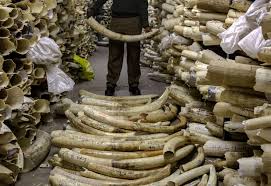Chantelle Bongubukhosi Ncube
Zimbabwe is facing a mounting financial crisis as it holds onto over 130 tonnes of ivory, worth an estimated US$600 million, locked away in warehouses due to a global ban on ivory trade. This significant stockpile has been amassed over the years under the stewardship of the Zimbabwe Parks and Wildlife Management Authority (ZimParks), as the international community continues to enforce stringent restrictions on the sale of tusks.
The global ban, enforced by the Convention on International Trade in Endangered Species of Wild Fauna and Flora (CITES), aims to curb poaching and protect endangered species, especially elephants. However, for countries like Zimbabwe, which have a large elephant population, the ban has led to a growing financial burden as the ivory sits idle, unable to be sold or put to any economic use.
Economic Strain and Conservation Costs
The accumulation of this ivory stockpile has put Zimbabwe in a difficult position. The country, which is grappling with a struggling economy and hyperinflation, could benefit from the sale of this ivory to fund wildlife conservation efforts and other developmental needs. ZimParks spokesperson, Tinashe Farawo, commented on the issue: “We are sitting on a treasure that we cannot use. Ivory from elephants that died naturally or were culled due to overpopulation could bring millions to conservation efforts, yet we are forced to store it.”
Zimbabwe has one of the largest elephant populations in Africa, with over 100,000 elephants, according to ZimParks. The cost of maintaining and protecting these animals, including anti-poaching efforts and habitat management, is high. Without the ability to sell ivory, the financial resources needed to sustain these conservation activities are under threat.
Pressure on the International Community
Many conservationists have called on the international community to rethink the ban, at least for countries like Zimbabwe, which have successfully managed their elephant populations. An interview with local wildlife expert, Dr. Leonard Ncube, highlighted the need for a balance between conservation and economic realities: “Zimbabwe’s elephants are not endangered, and the funds from ivory sales could be reinvested into protecting not just elephants but other vulnerable species. It is time the world acknowledges the unique situation here.”
However, lifting the ban is a contentious issue. While Zimbabwe argues for regulated trade, many global conservation organizations fear that any relaxation could open the floodgates to poaching across Africa, undermining decades of progress in protecting elephants.
The financial toll of storing ivory has been significant. Zimbabwe, which has faced hyperinflation and currency volatility in recent years, could potentially generate much-needed foreign currency from the ivory stockpile. Farawo noted that other African countries facing similar issues, such as Botswana and Namibia, have also expressed frustration at the continued ban.
An economist based in Bulawayo, James Ncube, commented on the potential impact of selling the ivory: “With the value of the stockpile standing at around US$600 million, that could cover a significant portion of Zimbabwe’s debt or be used to stabilize the economy. It’s a wasted resource that could make a real difference.”
The situation has also sparked debate among local residents and conservationists in Bulawayo. A local vendor, Grace Sibanda, shared her thoughts on the matter: “I understand the need to protect animals, but we are suffering. If selling this ivory can help the country, I don’t see why we shouldn’t do it, especially if the animals weren’t killed for the tusks.”
On the other hand, a conservation student from Lupane State University, Tatenda Moyo, emphasized the importance of maintaining the ban: “If we lift the ban, even for a short time, we risk encouraging poaching. It’s a tough situation, but we must think of the long-term consequences.”
The debate over Zimbabwe’s ivory stockpile underscores the tension between economic necessity and conservation ethics. As Zimbabwe continues to push for the global ban to be lifted, the ivory remains unsold, adding financial strain to a country already struggling with economic hardship. The question remains: should the world reconsider its stance on the ivory trade for countries like Zimbabwe, or would this open the door to new challenges in wildlife protection?
The global community, including CITES, is likely to continue deliberating on this complex issue, as Zimbabwe and other African nations advocate for more flexibility in managing their natural resources.
Zim GBC News©2024


